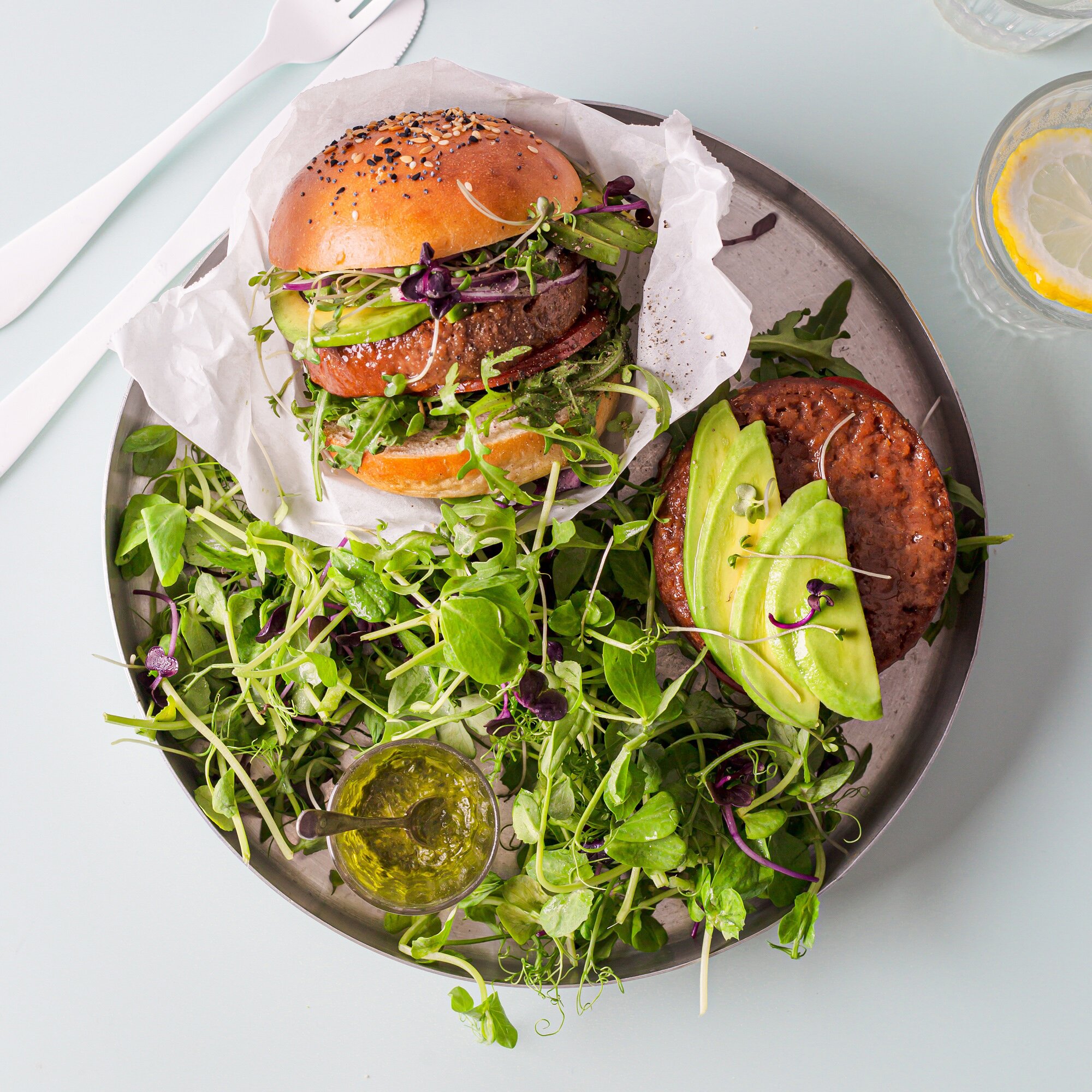Fake it till you make it: how to swap meat on your menu for vegan and vegetarian
How to answer the dilemma of customers who want to eat less meat and dairy, who want to make the ethical choice, but still crave the taste and texture? Bring in the substitutes, says Angela Frewin
We’re entering what Charles Banks, co-founder of the Foodpeople, dubs “the era of conscience cuisine... dictated by environmental and mindful eating”.
“Both environmental and personal health are at the top of the agenda and thus cuisines that lend themselves well to healthy, fresh, plant-based eating are likely to thrive,” he explains.
With 20% of consumers reducing the amount of meat they consume during lockdown, and predictions that one-quarter of Brits will follow a vegetarian or vegan diet and 50% a meat-reducing flexitarian diet by 2025, plant-based dishes look set to remain expected mainstream menu choices in the new normal.
Laura Iliffe, senior brand manager at the Vegetarian Butcher, says: “Many consumers concerned about the environmental, ethical and health impacts of eating meat have chosen to cut down their intake in recent years, leading to a huge increase in people identifying as flexitarian.
“For caterers, this is both an opportunity and a challenge: the need to satisfy consumers while cooking suitable-for-vegan dishes easily and without adding complications to the flow of their kitchen, but which also help to add breadth, diversity and wider appeal to their menus. There is therefore a real need and demand for products that can deliver both – which is where the meat replacements market is thriving.
The Vegetarian Butcher offers a range of meat replacement products that cook like meat, taste like meat and have the texture of meat. “We believe that delivering ‘all the wow without the cow’ when it comes to the flavours and textures of meat helps to satisfy flexitarian consumer cravings, at the same time addressing the concerns that drive them to cut down their intake in the first place,” adds Iliffe.
While world cuisine offers a cornucopia of vegan and vegetarian recipes, there’s a focus on protein-rich solutions for trendy but more restrictive vegan diets. As flexitarians are driving plant power – Mission Foods report that 93% of vegan meals are eaten by non-vegans – a popular approach is replicating well-loved meat dishes.

“There should be no fuss when it comes to meat alternatives; you can make the same delicious food vegetarian or vegan by simply swapping them in, as they should look, cook and taste the same as their meat counterparts,” says Jade Dodds, foodservice and quick service restaurant director at Meatless Farm. The company avoids over-flavouring its products to enable chef creativity, for example, replacing soya with a meatier pea protein formula across its burgers, meatballs and sausages. It is now targeting market gaps for plant-based hot dogs, fish, chicken and hand-held pastries.
“Vegan mince provides professional caterers with a basic ingredient that can be used in many different dishes, for many different diners, so it’s an ideal staple to have to hand,” says Gordon Lauder, managing director at distributor Central Foods. Its frozen KaterVeg vegan (and gluten-free) mince – using textured, seasoned soya protein – replaces meat in dishes such as spaghetti Bolognese, chilli, lasagne, shepherd’s pie and tacos.
Tom Bursnall, director at Miami Burger, regards the company’s new smoked, streaky mini rashers (made from textured wheat protein and beetroot extract) as ‘game-changing’.
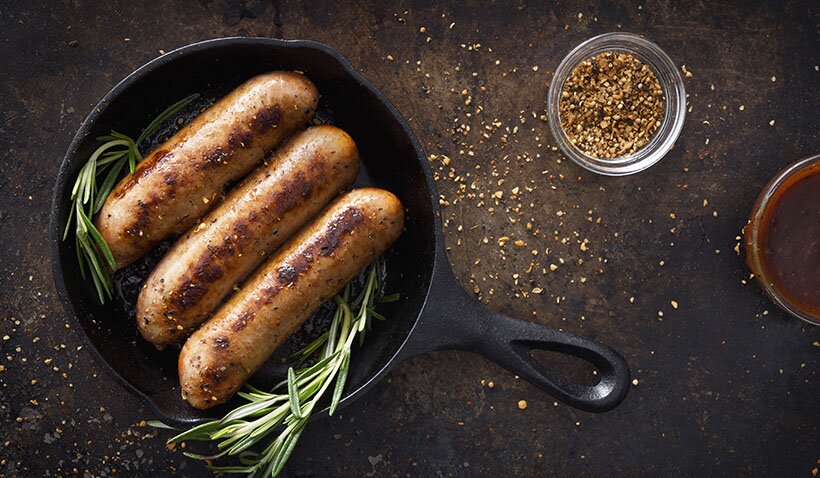
The brand – which avoids unsustainably farmed palm oil and Amazon-sourced proteins, saturated fats, titanium dioxide and MSG – has also added a pea and soya protein-based Lincolnshire sausage to its range, which also includes soya- and wheat-based ‘beef’ and ‘chicken’ burgers.
Go green
Another approach is to offer purely vegetable-based products for diners avoiding meat mimics and man-made ingredients. “A recent Gosh! study found that 86% of Brits have never heard of methylcellulose [a chemical compound and thickener derived from cellulose], which is used in a fifth of plant-based products. Furthermore, 40% of Brits believe plant-based foods only contain natural ingredients, while some products contain up to four additives,” explains marketing manager William Topp.
Gosh!’s additive- and allergen-free falafels, burgers, sausages and bites rely on blended, baked vegetables, pulses, herbs and spices. They are low in saturates, sugars and salt, and are registered by the Vegetarian, Vegan, Coeliac and Kosher food societies.
Gold&Green’s Pulled Oats – a mix of oats, broad beans, yellow peas, rapeseed oil and salt with a juicy, chewy texture and mild taste that sponges up flavour – is aimed at the 64% of consumers seeking 100% natural ingredients. The pre-cooked, frozen mince, veggie burgers, Nordic and Meze balls are sustainable and nutritious, with more protein than chicken and beef, says Simon Solway, country manager out of home UK and Ireland for Pulled Oats and Santa Maria sauces.
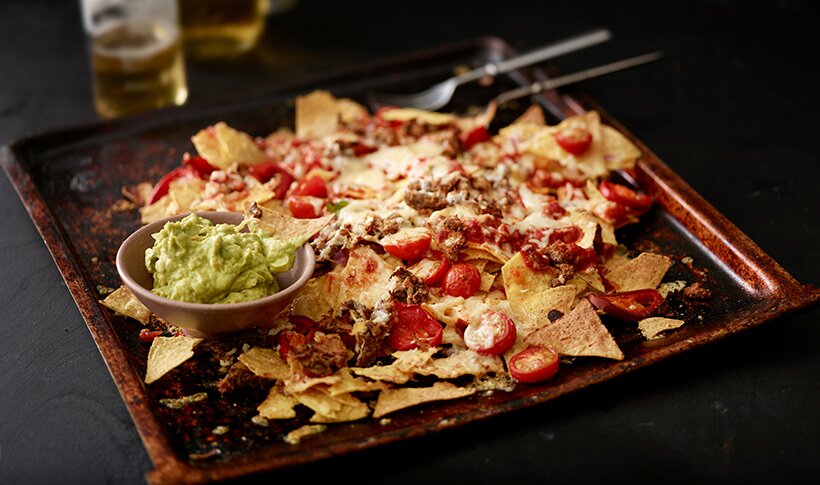
“Caterers say that while plant-based products have developed hugely in terms of texture, they can be lacking in flavour,” he says. Using Santa Maria’s Kerala Curry or Mexican Seasoning with Pulled Oats can help operators tap into tasty, popular cuisines, such as Indian and what Solway dubs ‘Mexitarian’ – Mexican-inspired vegan street-food-style tacos, burritos and Tex-Mex-style salads – as well as emerging Indian/Mexican fusions such as tandoori-style tacos.
Fiery harissa pastes, which work well across vegan, meat and fish dishes, are proving popular at Mediterranean and Middle Eastern ingredients supplier Belazu, while the current star is a tahini born of four years’ research. “The feedback is all about its complex flavour, creamy texture, smooth consistency, and its ability to transform all sorts of sweet and savoury dishes,” says head of product Laura Copp.
Spice things up
Consumers who discovered new dishes at home during lockdown “don’t want to go back to the same old stuffed peppers and mushroom risottos of the past,” observes Scott Dixon, managing director of the Flava People. He suggests adding value by pimping vegetables with colourful, punchy flavour glazes, oils and marinades along with flavoured crumbs and nuts to add layers of taste and texture along with visual appeal for the Instagram/Tik Tok generation.
“A katsu crumb, for example, brings in the bold spices and rich umami flavours of Japanese cuisine, a nutty ‘granola’ with za’atar adds a Middle Eastern touch, or a sprinkle of smoky chipotle adds a Mexican flavour.”
Its MRC Gold Seal oil-based marinades and sauces are cold-blended to retain freshness and colour and are free from artificial additives, allergens and gluten. The 12 blends include Chinese (star anise, cinnamon and ginger), Argentine Grill (smoky paprika, chipotle, red chilli and garlic) and a Greek fusion of garlic, rosemary and thyme.
Working mum Tanya Lambert found healthy plant-based sauce options were often ‘limited and bland’, and so she collaborated with top chef Ruth Hansom to create Tanya’s Just Real (pictured), the UK’s first vegan sauces to be cold-pressed to improve shelf life and optimise the nutrients, taste and texture of the raw vegetables, herbs and fruits.
Free from gluten, wheat and dairy, the six chilled sauces – gazpacho and chilli, soy and ginger teriyaki, smoked red pepper and paprika, mint, beetroot and horseradish, and cucumber and ginger – work as cold dips, condiments or dressings, or hot pour-overs, pestos, stir fries, marinades, and soup bases.
Decoy dairy
Vegetarian and flexitarian diners have popularised hot cheeses and made halloumi – ideal for hot sandwiches and grilled or barbecued veggie burgers and kebabs – the star of Eurilait’s continental dairy range, says commercial director Craig Brayshaw. The range includes portion-controlled slices, cubes, batons and the ‘much-in-demand halloumi fries’.
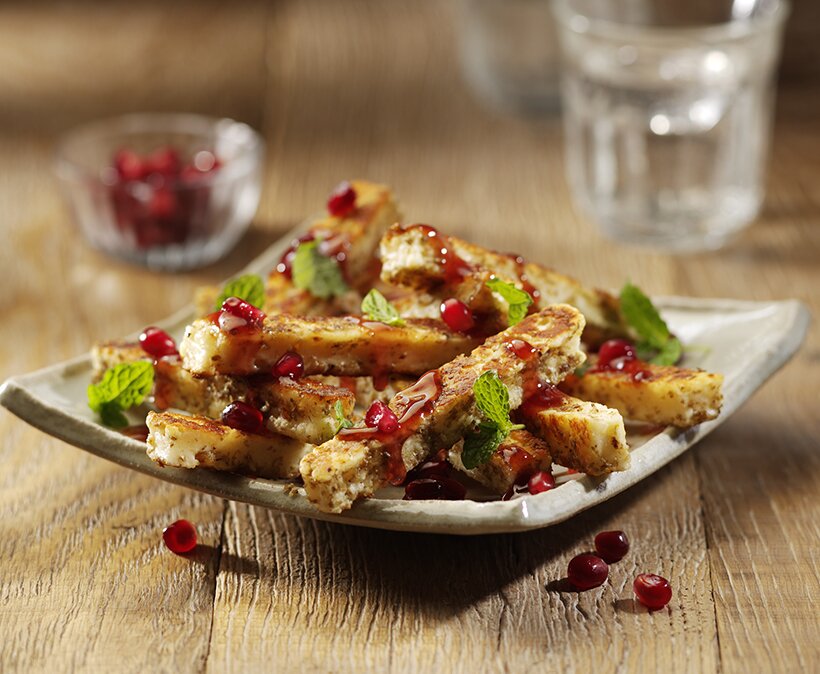
Eurilait recently introduced Willicroft’s ‘This is Not’ range of vegan cheeses, which Brayshaw says “share the characteristics, cooking performance, taste and texture of dairy items” using eco-friendly, sustainable, ethically sourced ingredients. Dutch-grown white beans – its most sustainable ingredient to date – underpin Willicroft’s new Cheddar and feta cheeses and will be extended to its existing cashew-based Parmesan, cheese fondue and cheese and truffle sauces, as well as its soya-based cream cheeses in classic, jalapeño and dill flavours.
Mintel notes that while 23% of Brits consume plant-based milks, few use them in cooking and hot drinks. Glebe Farm Foods director Rebecca Rayner says that its PureOaty milk (made from gluten-free wholegrain oats, not concentrated oat syrups) works well with espresso for dairy-free lattes or flat whites and is a “perfect baking partner” in treats such as chocolate tiffins or blueberry muffins.
Bakery product supplier Rich’s February survey of 1,000 customers found 17% of UK consumers were seeking dairy-free alternatives. “Taste is still king though, and while trial of dairy and meat replacements is high, repeat purchases rely on the products ‘being like the original’ in terms of flavour and functionality,” notes marketing director John Want. Rich’s new dairy-free cooking and whipping creams are based on canola oil, rice syrup and whole brown rice and, says Want, perform and taste just like dairy, and have no bean, grain or nut backnotes.
With more than two-fifths of consumers purchasing a dessert, cake or pastry when eating out, research by chocolate specialist Callebaut suggests a vegan offer can appeal to most diners, with 15% more likely to order a dessert that is vegan and 69% neither more nor less likely to. Its new downloadable recipe book includes vegan desserts, cakes, pastries and sweet breakfasts using Callebaut’s dairy-free 811 Callets Belgian dark chocolate, such as Rocky Road, cashew chocolate pots, and chocolate and orange cake.
An app for allergens
The plethora of differing free-from diets, allied with concerns over health, nutrition, allergens, provenance, sustainability and ethics, makes ingredient transparency and accuracy crucial to consumer confidence. Technology can help stretched staff keep abreast of suppliers’ ever-changing ingredients lists, suggests Wood.
Kitchen Cut’s recipe management system automatically updates supplier data across all sub-recipes, dishes and menus and creates embeddable menus and allergen tables that customers can filter by preference on websites, QR codes and social media links.
“As dishes and ingredients change, so too does the menu, so there’s no risk of a client ordering from an out-of-date menu with incorrect information,” says Wood.
Use your loaf
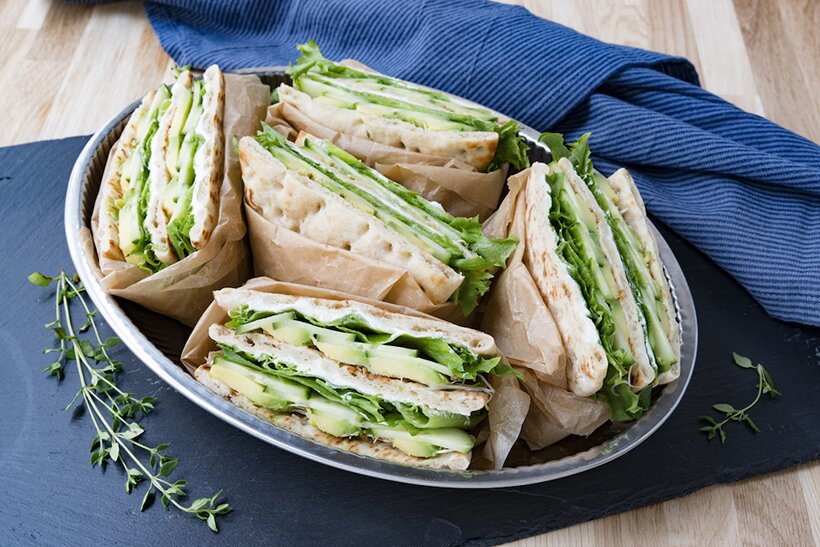
“Bread is one of the staples of many meals, whether that’s breakfast, lunch or dinner, or anything in between, so it makes sense to stock vegan breads that can then be used in different applications,” observes Jenny Jeppsson, concept manager at Swedish baker Polarbröd. “All bread from Polarbröd is vegan-friendly and free from milk and common food allergens such as sesame seeds, nuts, and eggs. This means the bread is suitable for a range of dietary requirements.”
Polarbröd’s five-strong range of flatbreads and thinbreads contain between 18% and 22% rye flour, which is rich in fibre, several key vitamins and minerals, and important for gut health and regulation of blood sugar and appetite.
Mission Foods’ vegan-friendly tortillas provide “a diverse and flexible foundation for plant-based menus”, says business development chef Kim Hartley. Available in a choice of sizes and formats to suit all channels, they come plain, bar-marked or in colourful flavours such as beetroot and chia, tomato and chilli, and spinach wheat flour.
Dietary diversity
Vegetarians, vegans and meat-eaters do not fall into clear-cut categories. Kitchen Cut founder John Wood outlines the range of dietary demands with tips on creating menus that appeal to all tastes.
Vegan – Avoid all animal and animal-produced products – meat, fish, fowl, eggs, dairy, honey, beeswax and gelatin.
Ovo/lacto/ovo-lacto vegetarian – Avoid meat, fish and fowl; may eat eggs (ovo), dairy (lacto) or both (ovo-lacto).
Pescatarian – Restrict meat consumption to fish.
Pollotarian – Restrict meat consumption to poultry and fowl.
Flexitarian – Predominantly a plant diet with occasional meat, poultry or fish.
Menu balance
Balance: Offer between 10% and 20% meat-free vegan and/or vegetarian dishes.
Creativity: Add interest with different cuisine types, spices and alternative products such as pulses and grains.
Variety: Offer a selection of dishes with different textures and elements.
Flavour: “Customers will not tolerate a bland vegetable cutlet or some boiled vegetables with new potatoes any more!”
Flexibility: Remove items such as dairy or gluten from some dish selections.
Lockdown home help

“During lockdown, home delivery was a lifeline for many operators. It will continue to be an important profit driver in the long term, making competition fierce,” advises Mohammed Essa, commercial director UK & Ireland at Aviko.
The potato processor has launched an online Delivery Ready hub for operators, complete with new recipes, menu planning guides, and ‘how tos’ on packing orders and digital marketing.
“With 63% of consumers trying to save money (MCA 2020) a key focus of the hub is helping operators bring added value and differentiation to their offering when price cuts are not an option,” adds Essa.
Consumer trends outlined on Quorn’s new online reopening toolkit, the Hub, include a ‘Create At Home’ movement with local and national restaurants offering pizza and burger kits, while three million people tried a vegetable box scheme or ordered from a local farm for the first time.
The Hub advises on adapting menus for the growing takeaway and ‘at home’ trends as well as new focused school menus, with recipes, cooking demos, marketing and POS help. Recent home delivery-focused lines include Quorn’s Vegan Deli range of ‘chicken’ and ‘smoky ham’ sandwich fillings, a vegan pepperoni for breakfast boxes, pizzas and salad boxes, and breaded and battered ‘fish’ fillets.
Early panic buying of staples such as pasta drove customers to experiment with new ingredients such as chickpeas and lentils. Sundance Confectionery answered this call with a wider range, offering all things free-from, with a focus on health, provenance, sustainability and ethics.
“The experience of preparing meals with alternative vegetables and spices has left consumers with more varied and diverse, even sophisticated, buying patterns in terms of pulses and spices,” said director Sky Jaskutelyte.
Suppliers
Aviko www.aviko.co.uk/delivery/bring-the-spark/home-delivery
Belazu www.belazu.com
Callebaut www.callebaut.com/en-GB
Central Foods www.centralfoods.co.uk
Eurilait www.eurilait.co.uk
The Flava People www.theflavapeople.com
Glebe Farm www.glebefarmfoods.co.uk
Gold&Green www.goldandgreenfoods.com/uk/food-service
Gosh! www.goshfood.com
Kitchen Cut www.kitchencut.com
Meatless Farm www.meatlessfarm.com/food-service/
Miami Burger www.miamiburger.co.uk
Mission Foods www.missionfoods.eu/trade.html
Polarbröd www.centralfoods.co.uk/Brands/Polarbrod.aspx
Quorn www.quornfoodservice.co.uk/eating-out
Rich’s www.richsfoodservice.com/pbcc
Santa Maria Foodservice www.santamariaworld.com/uk/foodservice
Sundance Confectionery www.sundanceonline.co.uk
Tanya’s Just Real www.tanyasjustreal.com
The Vegetarian Butcher www.thevegetarianbutcher.com


